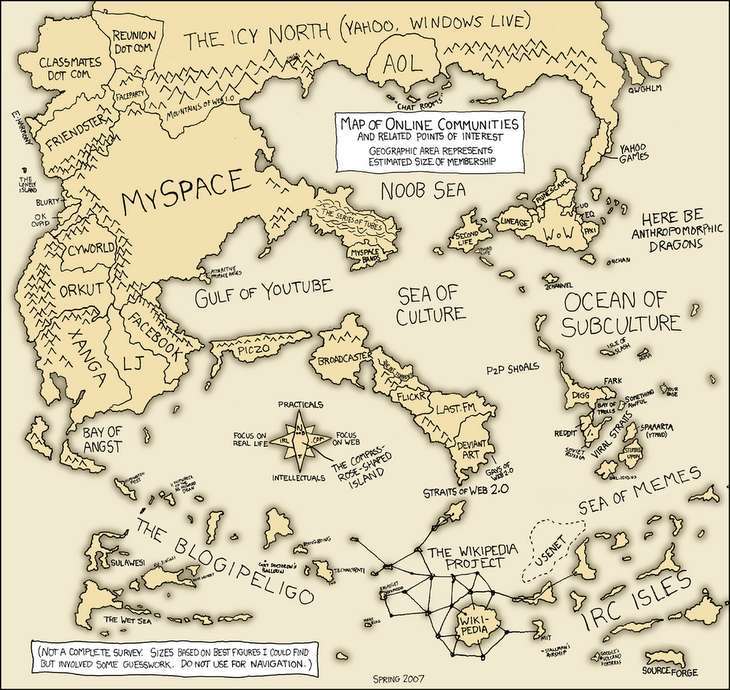From Computer-Mediated Small Groups to the Internet
-The authors surmise that we are experiencing an era of "networked individualism", shifting from tight-knit, geographically local communities to dispersed, sparsely-knit personal networks.
-Past research on computer-mediated communication (CMC) failed to situate CMC within broader social contexts.
-Past research demonstrates that, thus far, the Internet has had no salient destructive or radical effect on society.
The Social Affordances of the Internet
-supports a greater number of geographically dispersed interactions.
-asynchronous: these interactions can occur between those with very different temporal rhythms.
-rapidity: increased velocity of interpersonal exchange.
-reduced social presence may lessen commitment, complexity, and/or strength of virtual bonds.
-textuality: reduces image-based hierarchies, such as race and class.
-absence of direct feedback --> increased likelihood for flaming.
-societal connectivity: transitive, indirect contact facilitated in a manner that often crosses group boundaries.
-mass messaging: allows contact with multiple social circles.
-HOWEVER, often social networks do not interact, and information diffuses quickly.
Utopianism and Dystopianism
-Utopianism represented by the transformative ideals of Barlow, McLuhan, and others.
-Dystopians warned of the isolating and alienating potential of the Internet, warning ominously of societal decline (Kroker & Weinstein, Stoll) and fractured identities (Turkle).
-Both views are overly simplistic, lacking ethnographic and empirical data.
-Technological Determinism: Attributing causal effects to the technology rather than the way in which people choose to utilize it. For instance, the Internet was the effect rather than the cause of the desire for distant communication.
Contact With Friends and Family- Online and Off
-Though early findings demonstrated negative effects of Internet use, later findings uncovered that Internet use is inextricably tied to one's preexisting personality characteristics (Kraut).
-Other studies used time diaries to examine the everyday practices and effects of Internet use in comparison to offline interaction and found little to no causal relationship (various studies by Katz).
-Evidence exists that demonstrates the correlation between using the Internet to meet new people and decreased TV watching (Kraut, Kiesler, Boneva, & Shklovski).
-The needs of the individual must be examined as causally affecting the everyday usages of the Internet.
Forming Relationships Online
-Research has shown that only a very small percentage of Internet users have formed new relationships online (Katz).
-The Internet serves as an important tool for forming relationships for those who are physically or psychologically disadvantaged, including those with very low self-image (McKenna).
-Often, most users who form relationships online eventually express the desire to meet offline.
Neighboring and the Internet
-A study by Hampton and Wellman on a networked Toronto suburb, "Netville" demonstrated an increase in neighborhood contact, offline visits, and neighborhood ties. Furthermore, the networked residents showed an increase in contact with geographically distant social bonds. The combination of these two effects is defined by the researcher as "glocalization".
Towards a Theory of Networked Individualism
-Since the Industrial Revolution and the rise of mass transit and telecommunications, there has been a shift in social relations that Wellman coins "networked individualism".
-Networked Individualism:
1. Both local and long distance relationships:
Most likely, individuals virtually interact with those they are close to, but just far away from that it is inconvenient to visit.
2. Sparsely-knit personal networks that include densely-knit groups:
Ease in coordinating group events through mass messaging; direct and autonomous nature of the Internet helps one to maintain a large network of contacts with relatively little work.
3. Relationships more easily formed and abandoned:
In this era of mobility and frequent change in environment, CMC helps people stay in touch with those they've left behind. Additionally, the Internet may aid the sociality of those who have trouble forming relationships offline. It also aids in neighborhood connectivity, as demonstrated by the Netville study.
4. Many relationships with people from different social backgrounds:
Devoid of many of the social cues implicit in offline interactions, the Internet facilitates the formation of relationships between individuals of differing backgrounds.
5. Few strong ties and many weak ones:
The asynchronous nature of the Internet means that interactions need not take place in the same space at the same time. This can be an asset in everyday activities (such as shopping) that involve coordination with strong ties, for communicating in a way that lacks intrusion or disruption. Weak ties can be more easily maintained as well, allowing for affirmation of a connection to even the most geographically distant acquaintance.
In conclusion, the authors point to a need to examine the psychological effects of networked individualism, such as information overload and dissatisfaction or, more positively, cognitive flexibility, social tolerance, and increased knowledge.
---
This paper was published in 2004, around the time online social networking services were becoming mainstream in popularity, and before the advent of social media services such as YouTube. It focuses primarily on e-mail as a form of CMC. Examining society's relationship to the Internet in general, the authors are a bit too empirical and generalistic for my taste.
In developing surveys regarding interaction in online social networks, it would be interesting to examine a subpopulation of those who have recently transitioned into a new environment (such as college alumni) and their use of these tools in maintaining important social ties. How useful and satisfying is this medium? Furthermore, does the Internet actually facilitate group formation, or are these group memberships illusory in nature (serving the purpose of identity development and performance)?
May 2, 2007
Subscribe to:
Post Comments (Atom)






No comments:
Post a Comment